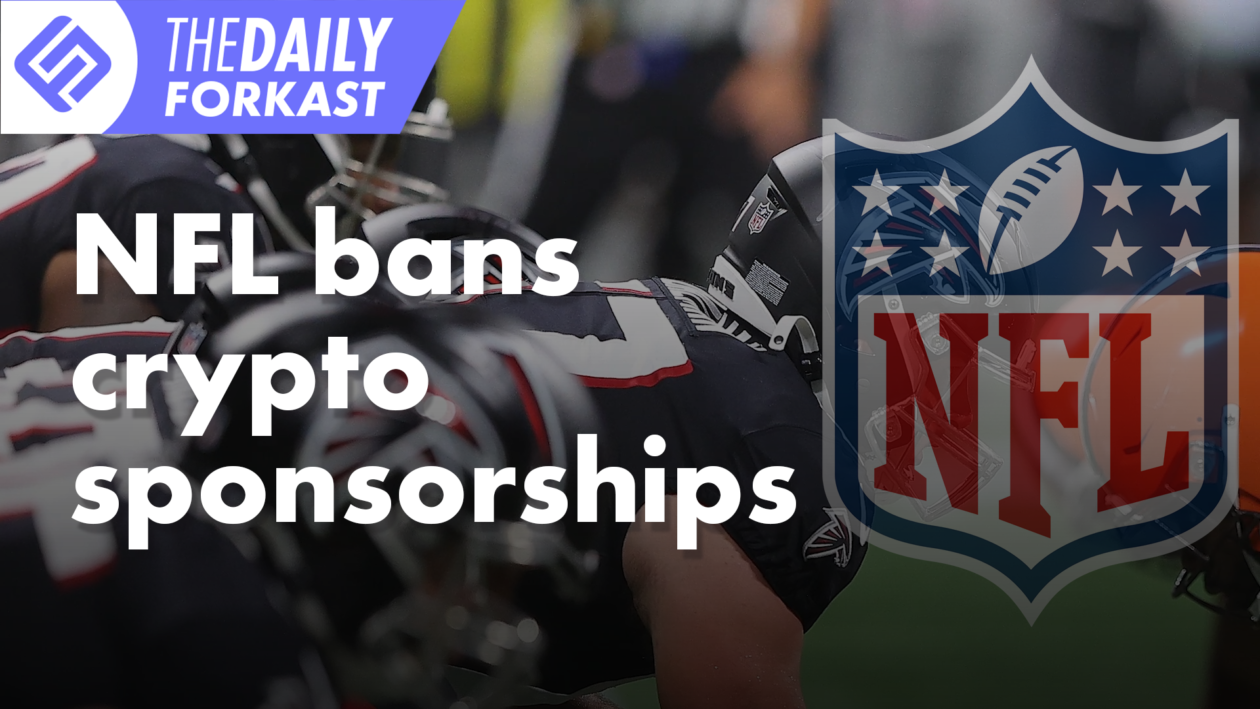Authorities offer a lifeline to some Korean crypto exchanges.
NFL bans crypto sponsorships.
Binance.com to end support in Singapore.
We’ll have more on those stories — and other news shaping the cryptocurrency and blockchain world — in this episode of The Daily Forkast, September 6th
Transcript
Welcome to The Daily Forkast, September 6th, 2021. I’m Justin Solomon of Forkast.News, covering all things Blockchain, filling in for Editor-in-Chief Angie Lau.
The race towards Korea’s September 24 deadline for crypto exchanges to comply with strict new regulations is heating up, with the authorities offering a lifeline to exchanges that have acquired the all-important Information Security Management System Certification.
We’re going to talk about that and a whole lot more coming up, from Asia to the world.
First up, there have been a number of moves in the race for survival by Korea’s crypto exchanges.
Three more major exchanges, Bithumb, Coinone, and Korbit, are now expected to make the cut, while smaller exchanges that met only half of the requirements get a breather, or at least so it seems.
Forkast.News Danny Park has the details.
Korea’s financial authorities gave crypto exchanges two conditions for them to meet by the deadline of September 24th – one: obtain the Information Security Management System Certification and two: a bank contract for users to have real-name bank accounts. Only Upbit, Korea’s largest exchange has met both conditions.
The next three biggest exchanges, Bithumb, Coinone, and Korbit have struggled to secure an extension on their bid contracts. But now numerous local reports say there’s a high likelihood they will receive their extension this week and thus fulfill both requirements.
Meanwhile, the smaller exchanges who have little chance of securing a bank contract have been given some leeway. The Financial Intelligence Unit says those who have obtained the ISMS certification can remain registered after review. However, they must remove all cash to crypto transaction services by September 17.
But one expert says without that, investors are unlikely to stay.
“Not being able to trade [Korean won] does influence users [to seek other exchanges]. But I think the biggest problem [for them] is the [negative] stigma from common investors as they have failed to fully report within the given timeframe.”
Only 21 exchanges have gained ISMS certification, which leaves another forty-something facing closure. The FIU says it will allow one month after the deadline for users to withdraw their money from them.
For Forkast.News I’m Danny Park.
Meanwhile, the National Football League is benching the crypto industry.
That’s right – the NFL has slapped a ban on teams from selling sponsorship to cryptocurrency trading firms and banned teams and players from selling NFTs.
So what does this mean for industry players hoping to get the crypto message out to the widest possible audience?
Forkast.News, Monika Ghosh reports.
According to a report in The Atlantic, the suspension on selling NFTs is set to remain in place until the NFL develops a strategy for digital trading cards and art related to the sport.
Under the new policy, clubs are also prohibited from selling or allowing advertisements for specific cryptocurrencies or Initial Coin Offerings on media controlled by them.
However, teams can collaborate with crypto-adjacent businesses, such as those that primarily offer investment advice or fund management services related to cryptocurrencies.
It’s a market that some key players in the industry, like FTX, have already tapped into, seeing potential to reach huge numbers of new customers.
Speaking to Forkast.News in July, Sam Bankman-Fried, CEO of FTX, which has stadium naming rights for the home of the National Basketball Association’s Miami Heat and a partnership with American football star Tom Brady says sports partnerships are a no-brainer.
“There just aren’t that many comparables for it. Like if you think about what other things are there that join together tens of millions of people regularly – elections, sports games.”
The NFL has a reputation for being careful about venturing into new markets. Earlier this year, it announced three official betting partners after fighting sports gambling for six years, and Diageo, which is one of the world’s largest producers of spirits and beers, became the NFL’s first spirit sponsor. Four years after the ban on liquor ads was lifted by the NFL in 2017.
If crypto ads follow a similar timeline, it could be quite a while until we see the suspension lifted.
For Forkast.News I’m Monika Ghosh.
And finally, the bad news for Binance continues. This time it’s in Singapore, where the exchange has announced that as of Friday, September 10, it is ending support for trading pairs and payment options in Singapore dollars, as well as removing itself from app stores in the country.
The move comes after Singapore’s Monetary Authority placed Binance.com on its investor alert list which flags unregulated entities that may have given the public the impression they are licensed by it.
A company spokesperson told Forkast.News the company is actively working with the MAS to address concerns.
Binance.com is a separate entity to Binance Singapore, and as only the former has been placed on the list, only it is reducing its exposure in the country.
The world’s biggest crypto exchange based on traffic, liquidity, and trading volumes has been facing regulatory pressure from around the world, seeing investigations and regulatory action taken against them in Japan, the U.S., and the Cayman Islands.
However, the exchange has had some good news of late with the UK’s Financial Conduct Authority announcing that it is now compliant with the requirements it imposed on the firm back in June, with regulatory authorities around the world on their case.
Looks like crypto exchanges everywhere need to pay attention on getting their houses in order.
And that’s the daily Forkast from our vantage point right here in Asia. For more, visit Forkast.News. I’m Justin Solomon. Until next time.

